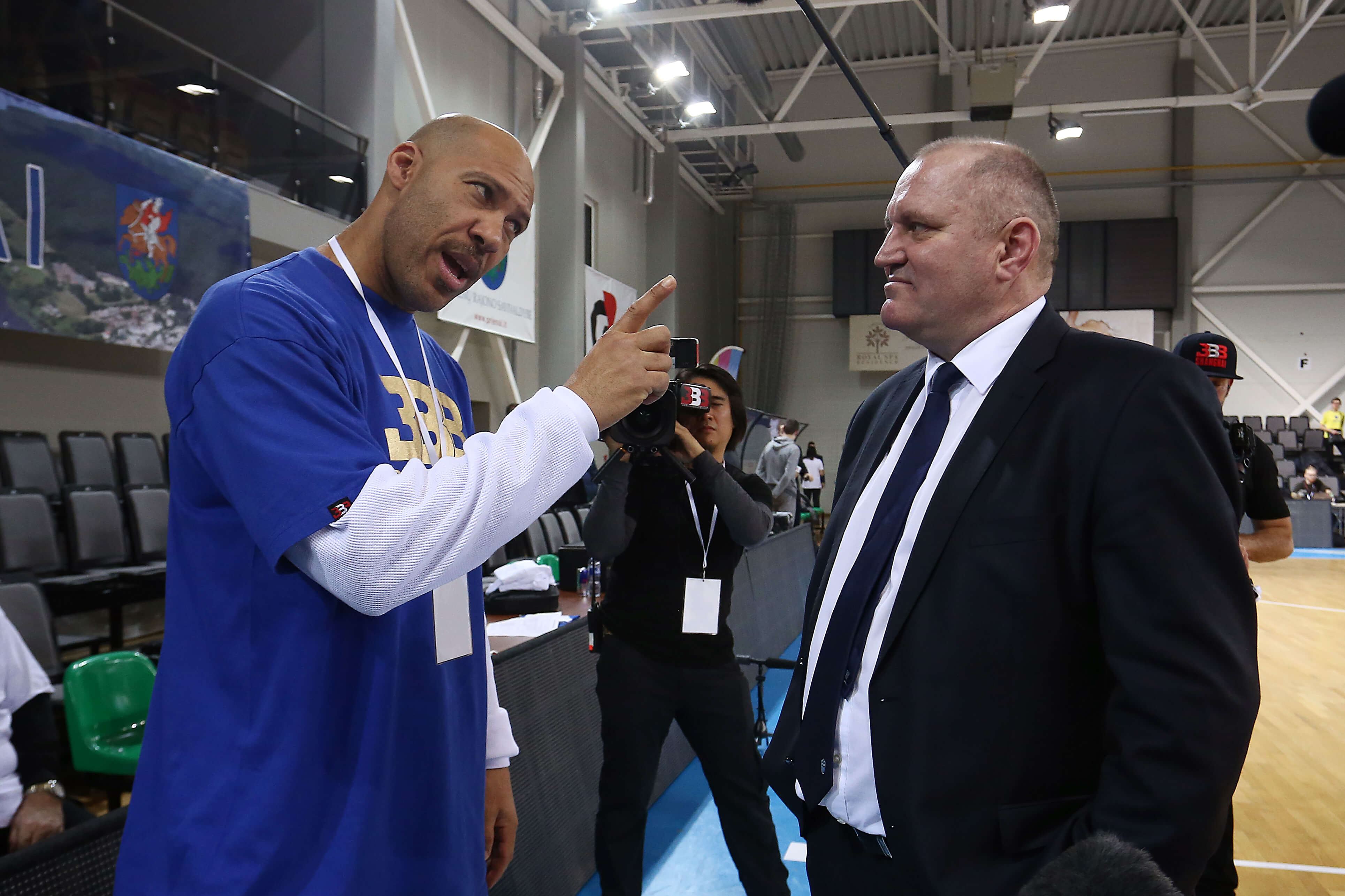The doors swing open. The boy with the floppy blond curls rushes into Prienai Arena. A group of Lithuanian teens, who arrived 60 minutes before tipoff, scurry over to get a closer look, but the boy ignores them. He’s locked in his own world as he spots two stone-faced security guards looking on from just outside the locker room. The boy, sporting a pair of black headphones and a Big Baller Brand sweatsuit, grins while Bruno Mars and Cardi B’s “Finesse (Remix)” blasts in the background.
It’s his time.
Sixteen-year-old LaMelo Ball clutches an imaginary rock. Dipping his shoulders left, then right, he rushes toward the two security guards and crosses over both men.
But a few seconds later, I watch fans abandon LaMelo for the man from whom he gets his smile. Here comes LaVar Ball.
Puffing out his chest, LaVar shimmies left to right in a navy suit and light-blue pocket square. He’s energized by the eyes set on him. Three cameramen from the family’s Facebook reality show, Ball in the Family, follow nearly his every move.
Now, it’s his time.
“Bet you didn’t think I could look this good, huh?” LaVar screams in delight at Virginijus Seskus, Melo’s coach. Seskus laughs, nervously. He doesn’t speak English.
It’s January 23, and tonight LaVar will join the bench as assistant coach for Prienai-Birstonas Vytautas, the low-level, last-place professional team Melo and his 19-year-old brother, LiAngelo, play for. The opponent? Alytaus Dzukija, a team that could pass for a Division III squad.

Alius Koroliovas/Getty Images
I watch LaVar smile as he takes selfies with fans, parading around like he did when he watched his eldest son, Lonzo, courtside when the Lakers visited Madison Square Garden. Except here there is no Jumbotron or tunnel or VIP lounge or concession stand. Just creaky hardwood and worn, gray seats. Only 1,500 of them. This gym, here in Prienai, Lithuania, a tiny town in the Baltic region of Northern Europe, sits next to a tall, snowy smokestack and an abandoned road. It’s where Melo has become the youngest American pro. It’s the perfect setting for the debut of a father with no collegiate or professional coaching experience, only AAU.
Just hours before, Big Baller Brand became an official team sponsor, a move after which BBB logos shamelessly graced the court and the backs of referees’ burnt-yellow jerseys for five games. The contest is broadcast live on Facebook. An MVP is awarded BBB kicks signed by Lonzo.
The game starts. Melo easily maneuvers through the wide-open key. Alytaus Dzukija seems allergic to defense. Melo throws no-look dimes and scoops in layups. The game quickly turns into who can make the most wide-open threes. Alytaus Dzukija’s Gediminas Zalalis drills one after having three Mississippis to get his feet set.
“Good defense,” Seskus manages in English, turning to me sarcastically right after the shot, breaking the fourth wall. Seskus begins to look like he’s getting boxed out of his scene altogether as LaVar rises from the bench and yells:
“Knockdown!”
“Yessirrrrrrrrrrrrrr!”
“And one!”
“There you gooooo!”
When he screams, “No. 10, come in,” it becomes apparent to me, after being around the team for six games and just over two weeks of practice, that LaVar still doesn’t know guard Paulius Ivanauskas’ name. Ivanauskas rolls his eyes. This isn’t the first time LaVar has attempted to “coach.”
Melo drains five consecutive threes as few bother to close out on him. By the end of the game, he drops a whopping 43 points. Vytautas wins with a video-game score of 147-142. Melo looks blank-faced, tired, somewhat resigned. LaVar is whisked away for an interview, eyes ablaze, his reality show finally becoming real life.






